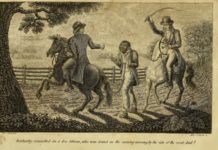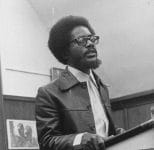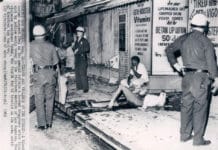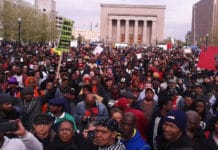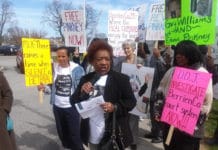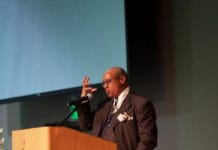by Abayomi Azikiwe
Detroit – Funeral services were held in Detroit on April 25 for Mrs. Mabel Robinson Williams, the widow of African American revolutionary Robert F. Williams. The couple had settled in Lake County, Michigan, in the western region of the state, after returning to the United States from exile in the People’s Republic of China in late 1969.

The Williams served as leaders of the Monroe, North Carolina, chapter of the NAACP during the 1950s until early 1961, when they were targeted by local authorities and the FBI. The civil rights organizers became advocates of armed self-defense against racist violence perpetuated by the Ku Klux Klan and law-enforcement personnel in the city.
Under the leadership of the Williams, the NAACP in Monroe was able to break down segregation in some public places and mount a successful appeal for two African American boys imprisoned after being falsely accused of assaulting a white female playmate. Williams gained national notoriety for forming rifle clubs that met racist violence with armed self-defense.
In 1961, during efforts to defend the African American community in Monroe from racist attacks, Robert Williams was falsely charged with kidnapping and fled into exile where he and his family spent the rest of the decade as guests of the Cuban and later Chinese governments. Although he was expelled from the NAACP for purportedly violating their guidelines on nonviolent resistance, the Williams gained support from other militant forces within the U.S. and internationally.
During this period they also traveled to various African and Asian countries including North Vietnam, where he met with liberation movement and communist leader Ho Chi Minh. They would open the way for other African American revolutionaries, including members of SNCC and the Black Panther Party, to visit China and Vietnam.

In Cuba the Williams continued to publish their newsletter, the Crusader, which was widely read by an emerging generation of revolutionaries who would lead the urban rebellions and form organizations such as the Revolutionary Action Movement (RAM), the Black Panther Party and the Republic of New Africa. His influence would also spread into the Civil Rights Movement, particularly within the Student Nonviolent Coordinating Committee (SNCC) and the Deacons for Defense based in Louisiana.

Also in Cuba, they hosted Radio Free Dixie, a shortwave radio program that could be heard throughout the Southern U.S. The program broadcast from Radio Havana, the official voice of the Cuban Revolution.
Later the Williams along with their children traveled to the People’s Republic of China, where through their work they compelled deeper solidarity between the Communist Party, then under Mao Tse-tung, and the African American revolutionary movement. In April 1968, Chairman Mao issued a statement in solidarity with the urban rebellions that swept the U.S. in the aftermath of the assassination of Dr. Martin Luther King Jr.
After returning to the U.S. in late 1969, Robert Williams was appointed as president of the newly-formed Republic of New Africa. Efforts to extradite him to North Carolina to stand trial on the bogus kidnapping charges was resisted and then Gov. William G. Milliken refused to honor the request, noting that he could not receive a fair trial.

Community leaders, officials pay tribute
During the funeral held at St. Paul AME Church on Detroit’s eastside, a number of community activists paid tribute to her life and work. These speakers included Elaine Steele of the Raymond and Rosa Parks Institute, Charles Ferrell of the Dr. Charles H. Wright Museum of African American History, former City Councilwoman JoAnn Watson and Congressman John Conyers, all of Detroit.
Williams was eulogized by church Pastor Andre L. Spivey, who is also a member of the Detroit City Council. Other clergy from Lake County, Fathers Joe Fix and Ron Schneider, also made remarks.
Williams survived her husband, who passed away in 1996. During their time in Lake County they engaged in community activism and Mabel continued to work tirelessly in the areas of human services related to nutritional concerns and support for seniors.
An obituary distributed to those who attended the memorial states in part:
“Through their advocacy and educational efforts, many foreign friends and world leaders became sympathizers and supporters of the African American struggle. In 1969 Mabel and Robert returned to the U.S. from three years in the People’s Republic of China. The two of them have been acknowledged for their contribution towards the thawing of relations between the United States and China during the Nixon administration which led to normalized relations with China. A museum was dedicated in 1999 to Robert, Mabel and other international fighters who had resided in China.

“Mabel and Robert worked tirelessly together as one, in their contribution to the struggle to uplift Black people and marginalized humanity. It is impossible to speak of Rob Williams’ accomplishments and exploits in the civil and human rights struggle without simultaneously discussing the significant role this warrior woman played by his side, at his back, out in front and behind closed doors as she followed Rob all around the world advocating and sounding the alarm for our people.
“Throughout her life, Mabel enjoyed greatly family interactions and many lifelong friendships. She was often described as a ‘people person’ by those who knew her and experienced her contagious smile.
“She leaves behind to grieve her passing her son John Chalmers Williams (wife Lisa) step-son Franklin Williams, grandsons Robert F. Williams III and Benjamin Paul Williams, great-granddaughters Cali and Sasha Williams, brother-in-law John H. Williams and a host of relatives and friends.”

Additional information on the life and legacy of Robert and Mabel Williams can be found at the following sources as well as many others: The Black Scholar (Spring, 2013); “Negroes With Guns” by Robert F. Williams; a documentary film and book entitled “Radio Free Dixie: Robert F. Williams and the Roots of Black Power” by Timothy Tyson. There are also documents stored at the Robert F. Williams Collection at the University of Michigan in the Bentley Historical Library, the Independent Lens documentary “Negroes With Guns: Rob Williams and Black Power,” and links to audio and video by and in tribute to Mabel Williams at Freedom Archives.
Abayomi Azikiwe, editor of Pan-African News Wire, where this story first appeared, can be reached at panafnewswire@gmail.com. Pan-African News Wire, the world’s only international daily pan-African news source, is designed to foster intelligent discussion on the affairs of African people throughout the continent and the world.

 Store
Store




